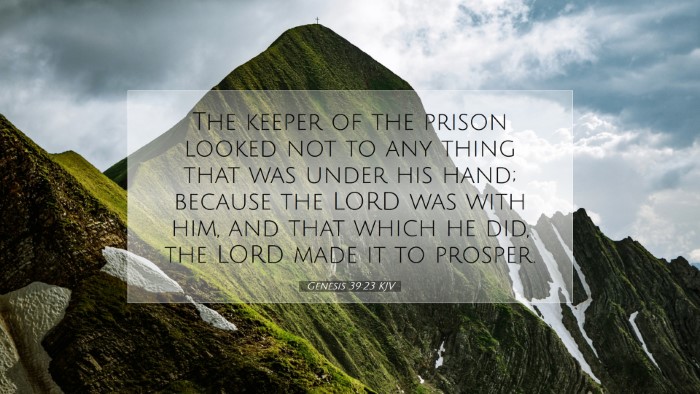Commentary on Genesis 39:23
Genesis 39:23 states, "The keeper of the prison looked not to any thing that was under his hand; because the LORD was with him: and that which he did, the LORD made it to prosper." This verse concludes the account of Joseph's time in prison, highlighting God's presence and providence in his life even in dire circumstances. Below, we synthesize insights from classic public domain commentaries to explore the theological and practical implications of this significant verse in the broader narrative of Genesis.
The Context of Joseph's Imprisonment
The narrative of Joseph has been a source of inspiration and instruction throughout biblical history. Joseph, having been sold into slavery by his brothers and then wrongfully imprisoned due to Potiphar's wife's accusations, found himself in a bleak situation. However, as the text underscores, divine favor accompanied him, which is a recurring theme in his life.
God’s Favor in Hardship
As Matthew Henry notes, the phrase "the LORD was with him" is pivotal. Despite Joseph’s misfortunes, God's presence was a source of strength and assurance. This reinforces the idea that God's purpose often unfolds through adversity. Joseph did not receive a divine explanation for his circumstances, yet he remained faithful, trusting in God's overarching plan.
The Role of the Prison Keeper
Albert Barnes points out the significance of the prison keeper's actions. By trusting Joseph and not overseeing his work, the keeper exemplifies a passive but profound acknowledgment of Joseph's integrity and capability. It shows that God's favor so transformed Joseph that even those in authority recognized his ability, thus allowing God’s plan to advance even in incarceration.
Prosperity through Divine Presence
Adam Clarke elaborates on the notion of prosperity in the verse. The word “prosper” here indicates that Joseph’s actions, infused with God’s presence, resulted in favor and success, irrespective of the grave circumstances. Clarke argues that success is not purely measured by material gain but also by fulfillment in the will of God, which manifests as peace and internal growth amidst trials.
Spiritual Lessons from Genesis 39:23
This verse offers several spiritual lessons that remain relevant to modern readers, including pastors, students, theologians, and scholars.
-
The Assurance of God's Presence:
In every situation, especially the difficult ones, believers can find solace in the assurance of God's presence. Just as Joseph experienced God's presence liberally in his life, so too can believers experience comfort and guidance in their trials.
-
Integrity in Adversity:
Joseph's seamless transition from a slave to a steward under Potiphar to a prisoner demonstrates that one's circumstances do not determine one's character. Hebrews 13:5 assures that God never leaves nor forsakes His people, encouraging believers to remain steadfast in integrity.
-
Divine Agency in Human Affairs:
The verse illustrates how God orchestrates events in ways unseen to human eyes. The prison keeper’s trust in Joseph reflects how God can affect the hearts of others to fulfill His divine purposes. As noted by Barnes, God was working behind the scenes, hinting at His sovereign control over all situations.
-
Success Defined by God:
Success is often redefined in the Scriptures. Joseph's success in prison, despite being an inmate, shows that true success is being right with God and fulfilling His purposes, regardless of external circumstances. It aptly situates believers to seek first the kingdom of God rather than worldly definitions of achievement.
-
The Importance of Faithfulness:
As Joseph remained faithful in his servitude, this verse underlines the call for believers to be diligent and faithful in all circumstances. God honors faithfulness and can elevate those who remain steadfast in Him.
Application for Contemporary Believers
Genesis 39:23 speaks powerfully to contemporary issues faced by believers today. In a world where inequity and injustice can lead to despair, this verse provides hope and encouragement. Believers are called to trust in the unseen hand of God, knowing that He is at work, even when circumstances suggest otherwise.
Encouragement in Trials
For pastors and spiritual leaders, this verse serves as a reminder to encourage congregants facing hardships. Much like Joseph, they should be assured that their labor will not be in vain, provided it is done in faithfulness to God. This principle can be applied in sermons and counseling, aiming to uplift those who feel sidelined by their struggles.
Encouraging Integrity
For students and scholars, the lesson of maintaining integrity amidst adversity is crucial. Academic and professional environments can often be hostile or fraught with moral dilemmas. The narrative of Joseph can serve as a case study in academic discussions, encouraging the practical application of integrity as a witness to God’s faithfulness.
Understanding God’s Sovereignty
The theological implications of God’s providence should be a central theme in teaching sessions. As lecturers and educators unpack the complexities of divine sovereignty, the experiences of Joseph in prison become a prime example of how God directs the course of history for the covenant community.
Conclusion
Genesis 39:23 encapsulates profound truths about God’s presence, human integrity, and the divine orchestration of events. As elaborated through the insights of various commentators, it challenges us to view our circumstances through the lens of faith and divine purpose. In every trial, believers are reminded that as long as the Lord is with them, there is a promise of prosperity that transcends worldly definitions and opens the door to spiritual fulfillment.


